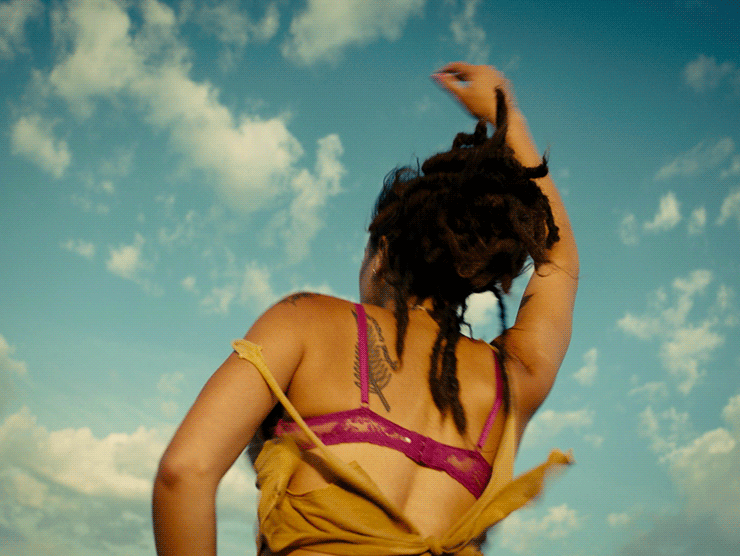NEW SERIES ALERT: Chris Feil will be talking soundtracks and music in movies every Wednesday! The first installment is on last year's Cannes winner American Honey:
Last year at Cannes, Andrea Arnold won her third Jury Prize for American Honey. The film follows Star (breakthrough star Sasha Lane), an Oklahoma teenager who leaves her rural life to sell magazines with a van full of forgotten youths. It’s a compassionate and condemning road movie, Arnold using music to provide a distorted reflection of the limits of the American Dream. You wouldn’t immediately think of Honey as defined by its soundtrack, but it is in so many rich ways.

Rihanna and Calvin Harris’s “We Found Love” still bangs as one of the most infectious and optimistic contemporary love anthems, and Honey wasn’t the first time it’s been used as such. The song hazily blares over a K-Mart loudspeaker, the first time Arnold distorts music to prevent us from falling into its spell. Across the aisles, Star locks eyes with Jake (a soulful, rat-tailed Shia LaBeouf). His flirtatious grin captivates Star as she shows off to her, his minions, and the patrons.
It’s a sparks fly kind of moment for Star, the kind of weak-kneed instant connection stuff of pop songs and teenage longings. The lyrics - “love in a hopeless place” - are a very literal projection of what is happening in this dingy megastore. But through the store’s tinny overhead reverb, Arnold creates a barrier between the audience’s and Star’s experience of the moment. For her it’s yellow diamonds, but we can’t be quite so rapt.
Star joins Jake’s ragtag group of would-be salespeople, led by the prickly matron Krystal (Riley Keough) in daily motivational hip hop chants. The gang feels empowered by hard rap with the kind of nonchalant, whiteboy bravado that’s an insidious specialty of the white teenage American midwest. Their ease with rapping along to racial slurs in the lyrics is especially jarring considering Star is the only person of color among their ranks, which goes acknowledged. In this way, Arnold reveals the drive to belong to a unified group can mean ignoring reality in problematic ways - she's condemning the system that ruins these kids.
Honey uses music for its depiction of sex to show teen sexuality both as part of this system and its own form of escape. Awkward white girls grind in unison as a kind of hapless rebellion that objectifies them. “We Found Love” reprises as a poisoned flipside to Star’s flirtations as she dances wildly for roadside men. A rapturous sex scene is capped with Mazzy Star’s “Fade Into You”, the perfect song to capture the feeling of soul-consuming sex clouded by an unfillable longing.
The greatest example of the film’s ability to musically live both in Star’s experience and its own thematic agenda is its namesake singalong finale of Lady Antebellum’s “American Honey”. Long after the group’s locale hopping has grown repetitive and their hope grows stagnant, a moment of quiet falls into a chorus of nostalgia for sweeter days gone by. Like before, Arnold frames the moment with remove, resisting joining the wave of feeling she is depicting. In the rearview mirror, we spot Krystal with her eyes on the road, not singing along.
As Star glances around at the faces getting caught in the moment, Arnold somehow captures the sadness behind their naive joy. It’s a van of aimless souls on the road to nowhere though the music promises they’ve been somewhere - a lie they were told that was supposed to mean something. Out of tune, they sing along to the very sentiment meant to keep them in this hopeless place by the hands at the wheel. Star doesn’t join in, but she could at any moment.
A final coda comes with a fireside revelry to Raury’s “God’s Whisper”, a thunderous chant suggesting a coming reckoning. “You think I am nothing” the song says, the kids singing along with some vague prophecy we know won’t come. Arnold’s proposed reckoning is not just for the very system that makes this true but for Star: will she fall prey to the fallacies her peers believe, the submissive hivemind that holds them back, or will she chart her own path? Star walks away from the group as the song ends and bathes herself in a nearby pond. Is the moment transformative or has Star been consumed?

American Honey’s soundtrack provides more insight by how each song is interwoven throughout, much as the film’s themes make up more than a road movie about poverty. It provides a subtextual language for Arnold to reveal her point of view while still reflecting the young people it follows - the wild, wild whisper blowing through the film.
American Honey is now streaming on Amazon Prime! What soundtracks would you like to read about?